| Article ID | Journal | Published Year | Pages | File Type |
|---|---|---|---|---|
| 10796083 | Biochimica et Biophysica Acta (BBA) - Bioenergetics | 2005 | 7 Pages |
Abstract
Mitochondrial uncoupling proteins only catalyse proton transport when they are activated. Activators include superoxide and reactive alkenals, suggesting new physiological functions for UCP2 and UCP3: their activation by superoxide when protonmotive force is high causes mild uncoupling, which lowers protonmotive force and attenuates superoxide generation by the electron transport chain. This feedback loop acts to prevent excessive mitochondrial superoxide production. Superoxide inactivates aconitase in the mitochondrial matrix, so aconitase activity provides a sensitive measure of the effects of UCPs on matrix superoxide. We find that inhibition of UCP3 in isolated skeletal muscle mitochondria by GDP decreases aconitase activity by 25% after 20 min incubation. The GDP effect is absent in skeletal muscle mitochondria from UCP3 knockout mice, showing that it is mediated by UCP3. Protection of aconitase by UCP3 in the absence of nucleotides does not require added fatty acids. The purine nucleoside diphosphates and triphosphates cause aconitase inactivation, but the monophosphates and CDP do not, consistent with the known nucleotide specificity of UCP3. The IC50 for GDP is about 100 μM. These findings support the proposal that UCP3 attenuates endogenous radical production by the mitochondrial electron transport chain at high protonmotive force.
Keywords
Related Topics
Life Sciences
Agricultural and Biological Sciences
Plant Science
Authors
Darren A. Talbot, Martin D. Brand,
